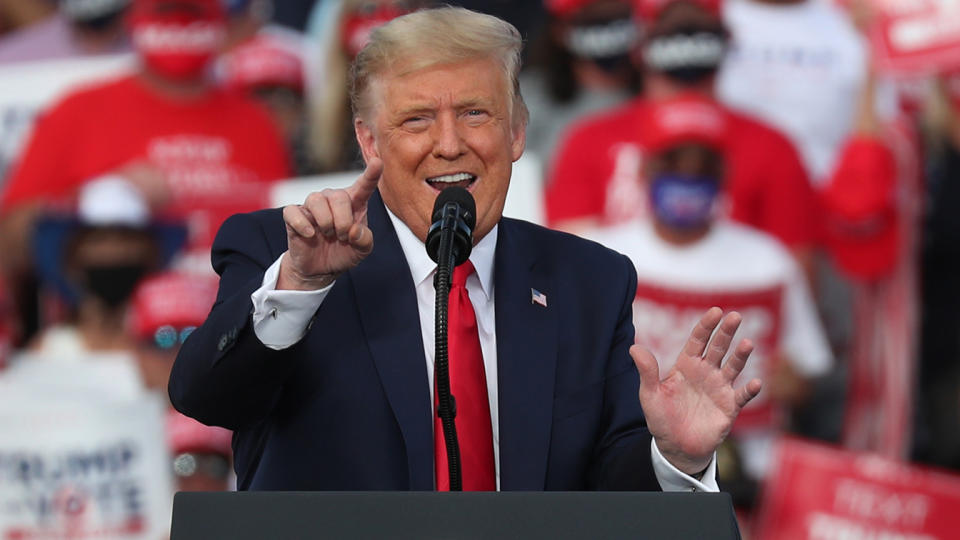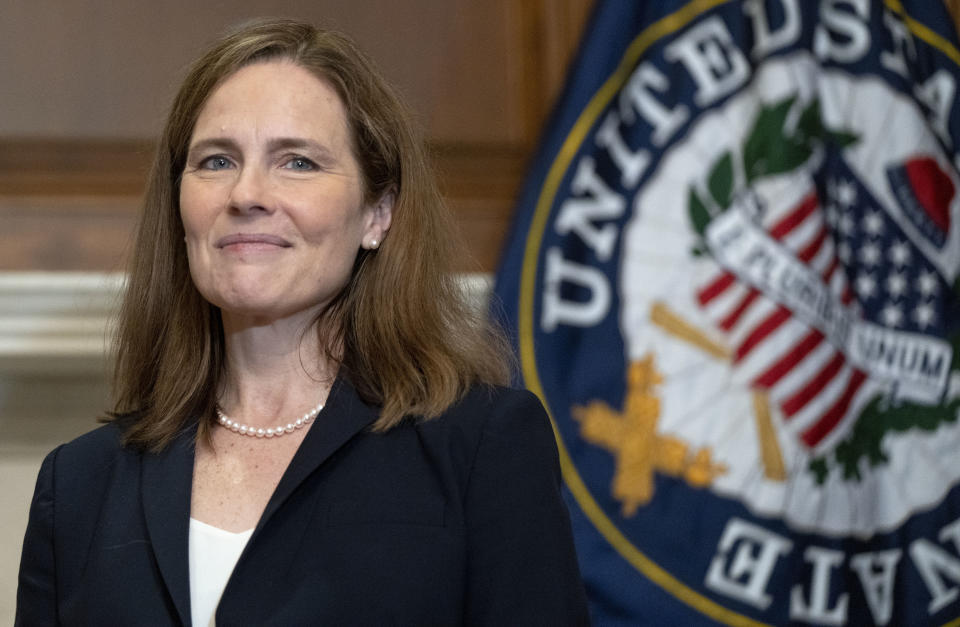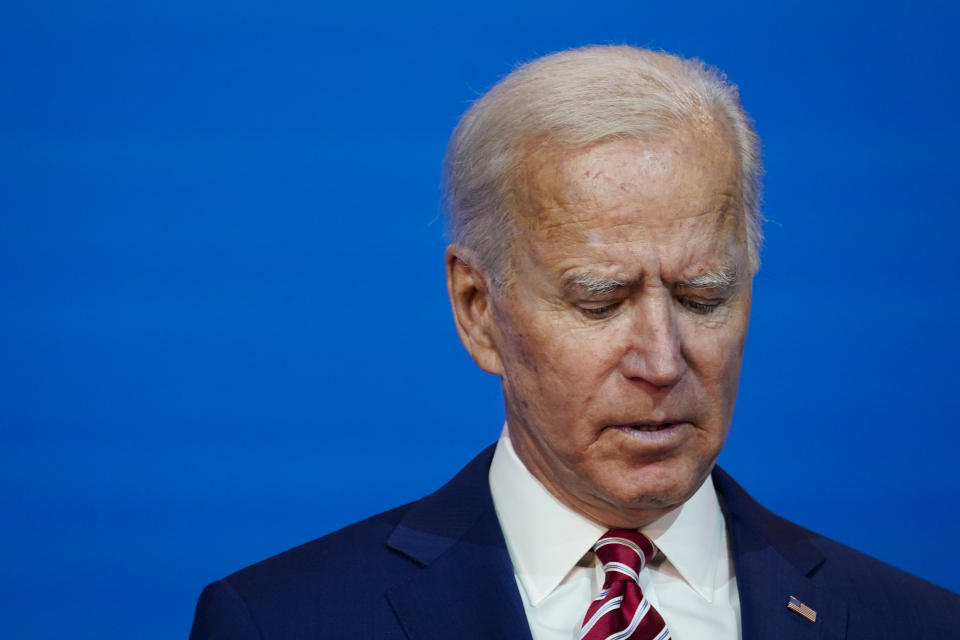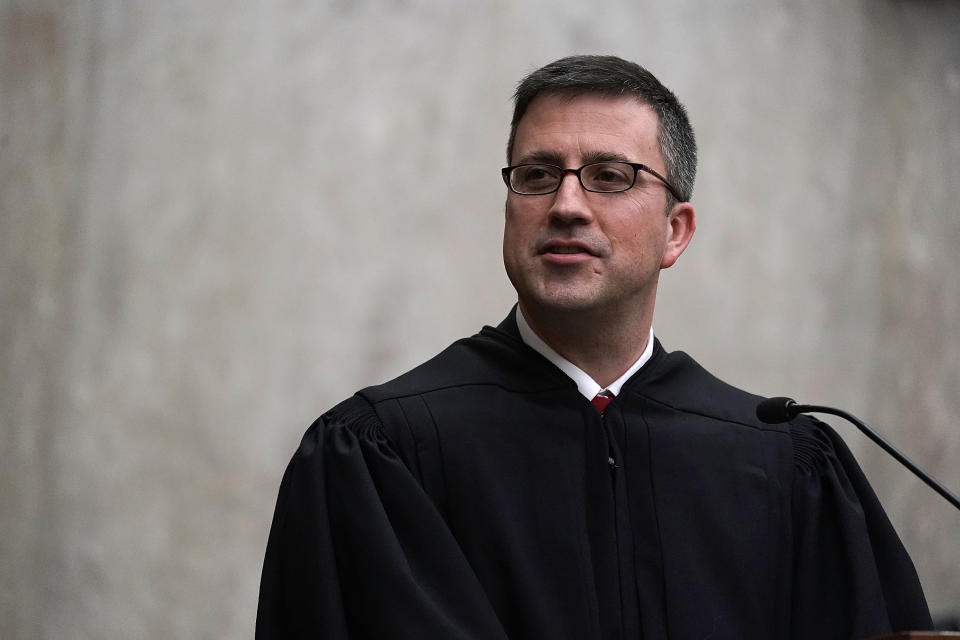Amy Coney Barrett's confirmation shows how the courts will be Trump’s most lasting legacy
- Oops!Something went wrong.Please try again later.
WASHINGTON — In less than two weeks’ time, the United States could have a new president-elect in Joe Biden, now the Democratic nominee for the job. Polls indicate that is likely to be the case. Those same polls say that the Democrats will not only keep control of the House of Representatives but potentially regain control of the Senate, which they lost in 2014.
But even if the Republican Party suffers defeat on Election Day, it can rest safely in the knowledge that it has fully remade the federal judiciary in its image. What’s more, the right-leaning judges the GOP has installed across the nation at every level, from the Supreme Court to district courts, are likely to remain on the federal bench for generations.
In other words, even if Trump loses, his movement has already won.
Monday night’s confirmation in a 52-48 vote of Federal Appellate Judge Amy Coney Barrett to the Supreme Court is the capstone of those efforts, giving conservatives the 6-3 majority they have long sought. That confirmation — which comes as both Trump and many of his allies in the Senate face potential potential defeat in an election that is just days away — highlights how effective the Republican takeover of the judicial branch has been.
“For the first time in more than 80 years, we will have a true conservative majority on the Supreme Court,” said Mike Davis, who runs the Article 3 Project, a group that advocates for conservative justice. Echoing a favorite Trump theme, Davis hopes that Barrett will “protect everyday Americans from government overreach and mob rule.”
At 48, Barrett is the youngest judge on the Supreme Court by nearly a decade. But she is far from the youngest judge Trump has nominated to the federal judiciary. The youngest of those judges, Kathryn Kimball Mizelle, is only 33. The average Trump judge is not only young but white and male. On the appellate level, he did not appoint a single Black judge.
As the Barrett confirmation moved towards its expected — if contentious — conclusion on Sunday night, Mitch McConnell, the Senate majority leader, made a frank acknowledgement of the political reality at hand. “A lot of what we’ve done over the last four years will be undone sooner or later by the next election. They won’t be able to do much about this for a long time to come,” he said.
Installing conservative judges has been McConnell’s project much more than it has been that of President Trump, who only adopted the cause as his own late in the 2016 presidential election, as he was struggling to convince religious and social conservatives that he was on their side. His boldest and most effective overture to that base was a list of potential judges he would nominate to the Supreme Court if elected, a dream roster of originalists who opposed Roe v. Wade, the Affordable Care Act, limits on Second Amendment freedoms and curbs on corporate power.

In total, Trump has confirmed 220 judges, including Barrett. That is more than all of his recent predecessors, including those who served two terms. And while Trump gets the ultimate glory for each successful confirmation, McConnell is the one who quietly sees the process through, working his special brand of political magic on a pliant president.
“I love the tax bill and a lot of the other things we did,” McConnell told Politico in 2018 about the administration’s accomplishments to that time. “But I think lifetime appointments — not only to the Supreme Court but to the circuit courts — are the way you have the longest-lasting impact on the country.”
For that reason, judicial appointments are a common refrain at Trump’s campaign rallies, with the president unspooling dark and often inaccurate warnings about how those judges are a final bulwark against an erosion of freedoms he says will be ushered in by Democratic rule and the “radical-left judges” they will appoint.
Those judges would “destroy our country,” Trump told interviewer Eric Bolling of Sinclair Broadcast Group last week.

Some Democrats want Biden to expand the Supreme Court if he is elected. He may be able to do so, but that will still leave the federal appellate and district courts largely as Trump and McConnell have made them. At least a full quarter of those judges are there because of Trump. As one conservative writer noted upon the confirmation of Trump’s 200th judge over the summer, “there’s pretty much nothing Democrats can do about it.”
The judges Trump nominated were carefully vetted by the Federalist Society and other conservative organizations. While they are not expected to show fealty to the president directly, many have ideological convictions that are unlikely to shift with a new administration.

Sen. Sheldon Whitehouse, D-R.I., denounced the Barrett confirmation as “a massive, sophisticated, dark-money campaign” that, in his view, has little to do with the populist sentiment conservatives frequently brandished. He called Barrett a tool of “corporate and right-wing donor interests.”
A new “Anti-Democracy Scorecard” published by the progressive group Take Back Our Courts found that Trump-appointed judges are more likely than either judges appointed by other Republican presidents, or by Democratic presidents, to issue rulings that make it more difficult to vote.
The issue of voting rights could be critical if the Nov. 3 election is contested. But even if it is not, Democrats will find that their agenda is likely to be challenged by, among other forces, Republican state attorneys general who can and will reasonably expect favorable hearings from Trump-appointed judges. Republican attorneys general frequently sued the Obama administration over environmental protections and the Affordable Care Act. Only now, the judiciary is significantly more favorable to them, and to other potential conservative litigants, than it was four years ago.
That will be especially true at the appellate, or circuit, level. The Supreme Court only grants a writ of certiorari to a minuscule fraction of the thousands of petitions submitted each year, meaning that most legal battles will have their terminus at the appellate level. Trump has so thoroughly remade those circuit courts, that not a single vacancy remains.
Many of these judges are steeped in the same constitutional “originalism” that Barrett has espoused, and which critics say is little more than an intellectual disguise for conservative political activism. Whatever one calls it, those judges have made their presence on the bench known.

“President Trump has an unmatched record of appointing qualified judges who believe in applying the Constitution as written, not legislating from the bench,” White House spokesman Judd Deere told Yahoo News, adding that Trump’s appointments ensured that “the rule of law will be preserved for generations to come.”
Trump’s opponents fear that Trump has merely enshrined conservatives principles that, in some instances, contravene the popular will. That will has little traction when it comes to the courtroom.
Five judges appointed by Trump to the 11th Circuit, for example, sided with Florida Gov. Ron DeSantis, keeping in place restrictions on people with felony convictions from voting — despite those restrictions having been removed by popular referendum.
In a case before the Third Circuit, a New Jersey woman who alleged sexual discrimination at a Sears outlet had her case dismissed. The tie-breaking vote on the three-judge panel came from Peter Joseph Phipps, a Trump appointee.
A similar tiebreaker was cast by another Trump judge, Ryan Nelson, in a Ninth Circuit ruling regarding immigration. That decision, in a case known as Ramos v. Wolf, will end temporary protected status for as many as 300,000 immigrants without documentation.
Trump appointed judges do not always rule as expected. For example, in Idaho, District Court Judge David Nye halted the implementation of a bill that has been called discriminatory to transgender athletes. Nye is older and more experienced than most Trump judges.

More typical is Trevor McFadden, whom Trump placed on the highly consequential D.C. district court. When House Democrats sued Trump for exceeding his constitutional authority in shifting congressionally appropriated funds to build a border wall, McFadden ruled in favor of the president.
Another district judge appointed by Trump, William Stickman, ruled that coronavirus restrictions imposed by Pennsylvania Gov. Tom Wolf, a Democrat, were unconstitutional.
Trump judges will likely continue to issue similar rulings even if a future Democratic administration were to pass a sweeping environmental bill akin to the Green New Deal, a genuine public health care option or new gun control restrictions.
There will, of course, be exceptions, especially among judges who want to distance themselves from Trump and show their intellectual integrity and independence. For example, one of McFadden’s colleagues on the D.C. district court, Trump appointee Carl Nichols, ruled that Trump could not stop New York state from seeking his taxes.
With more than 200 judges having been confirmed during the Trump presidency, conservatives can tolerate the occasional dissent. The odds, after all, are overwhelmingly in their favor. Even with the presidential campaign nearing its end and the coronavirus entering a potentially devastating third wave, Trump has continued to nominate judges. Currently, there are 37 nominees awaiting confirmation.
_____
Read more from Yahoo News:



